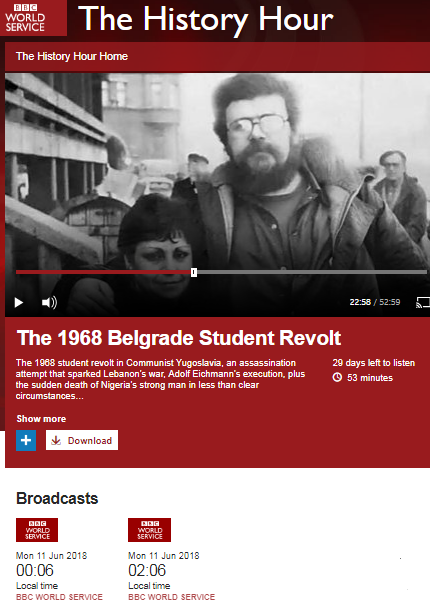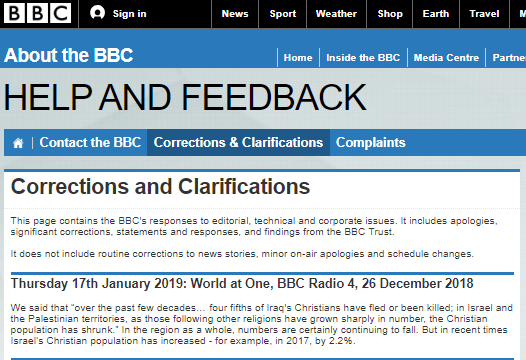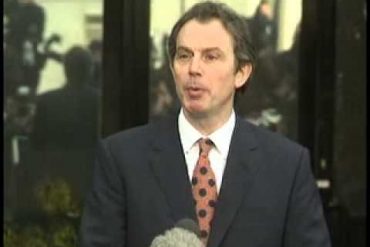The November 12th edition of the BBC World Service radio programme ‘Newshour’ – presented by Lyse Doucet – included an item (from 19:16 here) about a recent performance by the Israeli national theatre company.
Doucet introduced the item as follows:
“To Israel now, where politics has taken to the stage – literally. There’s growing tension with the country’s national theatre company and the wider artistic community after the company ‘Habima’ performed in the West Bank Jewish settlement of Kiryat Arba – close to the Palestinian…largely Palestinian…town of Hebron, dominated by hardline settlers. One of the actors, Shlomi Bertonov, refused to perform in the play; ‘A Simple Story’ based on a Hebrew short novel by the Nobel prize winnister…winner…SY Agnon. The culture minister of Israel Miri Regev attended the event which took place in a community centre. She’s threatened to cut funding to all arts groups who refuse to perform in the settlements. So just how controversial is this? We’re joined on the line now by Haim Weiss – he’s a literature professor at Ben Gurion University. Thank you very much for joining us.”
Weiss: “Thank you.”
Doucet: “What did you think of a performance taking place in Kiryat Arba?”
That disingenuous question conceals the fact that there can be no doubt that Lyse Doucet knew exactly what her inadequately introduced guest thinks about the topic. Haim Weiss was not asked to appear on this programme because of his expertise in literature as listeners may have concluded from Doucet’s introduction. He was chosen because, as Ha’aretz reported on October 25th, he initiated a campaign against the ‘Habima’ performance in Kiryat Arba – which is not disclosed to World Service audiences.
“The controversy over Habima’s performance in Kiryat Arba was sparked by two recent Facebook posts by Haim Weiss, a senior lecturer in Hebrew literature at Ben-Gurion University of the Negev.
In his first post, Weiss alluded to the incentives and penalties introduced this year in the Culture and Sports Ministry’s criteria for financial support. Cultural institutions that appear in the settlements receive a 10-percent bonus, while those that stay away see ministry support cut by about a third. […]
In a reference to the culture minister, Weiss wrote on Facebook: “It turns out that the spirit of the commander is working and the fear of Miri Regev’s open or concealed threats are doing the trick.”
The post was featured next to a picture of a fence with a poster advertising the Habima performance in Kiryat Arba.
“The willingness of the theater, its employees and actors to take part in the process of normalizing the occupation and turning Kiryat Arba into just another city where they’re performing is very disturbing,” Weiss wrote.
“Are the theater’s economic difficulties and the hope that a performance in Hebron will encourage the culture minister and other ministers to help the theater what’s leading to the performance in Kiryat Arba-Hebron?” […]
In a later post, Weiss wrote about what he considered the significance of the theater’s performance.
“When Habima, with its canonic (and complicated) standing in the Zionist and Israeli discourse, chooses to appear in a city that symbolizes more than any other the violence and racism of the settlement enterprise, it’s taking a step of major significance,” he wrote.
As Weiss put it, “The Habima Theater is conferring validity, significance and legitimization upon the settlement enterprise, especially its most extreme and violent representation. Kiryat Arba’s residents understand this symbolic significance very well and are therefore very pleased about the theater performance in their city.””
In other words, Doucet and the ‘Newshour’ producers knew exactly what kind of messaging they would be promoting (with no alternative views voiced) to the programmes audiences.
Weiss responded to Doucet’s ‘question’ as follows:
Weiss: “I think that the fact that the Israeli government is…is interfering with artistic decisions and telling the national theatre where to perform and where not and enforcing…and the minister of culture is enforcing her will upon the theatre by using money, this is a very disturbing thing. The theatre must have free…must be free – completely free – to decide where to perform and where not. The fact that before the show the minister gave a lecture or a speech to the same audience – this is a very disturbing thing.”
Making no effort to clarify to listeners that the financial aid given to theatre groups is financed by taxes paid by Israeli citizens living on both sides of the ‘green line’, Doucet continued:
“And is this – I don’t need to tell you that there’s a vibrant artistic community in Israel – is this…is this very much dominating the conversation now?”
Weiss: “I don’t know if it’s dominating the conversation. The big question is the occupation itself. We are dealing with some of its symbolic representations which is the performance of ‘Habima’ in Kiryat Arba. Since we cannot fight or stop occupation we are trying at least to be…or to say something about its symbolic representations and the fact that the national theatre of Israel is going to Kiryat Arba which is not a usual settlement. It’s not a real…a regular settlement but this is the base or the cradle of the fanatic, racist eh, eh, settlers movement and we have…and the fact that the ‘Habima’ is come…is going there mean that all…it’s like the whole artistic establishment in Israel is going – in a way – is going to Kiryat Arba. We don’t want the national theatre of Israel to go to Kiryat Arba.”
Doucet: “And can they resist? Because as you know, the theatre company has a financial crisis.”
Weiss: “[sighs] This is complicated. Since the government tied performing in the occupied territories with the financial support that the government should give all theatres, so the fact…the real fact is no: they cannot fight it or they cannot resist it. The price of resistance is very high.”
Doucet then brought the item to a close, making her own stance amply clear.
“Haim Weiss; I’m afraid we have to leave it there but thank you very much for speaking with such clarity and conviction about this…this development with the artistic community of Israel.”
The Israeli Ministry of Culture and ‘Habima’ (which appeared in other communities in Area C long before the current minister of culture took office) were not afforded the right of reply in this item.
Neither of course were any of the more than 7,000 residents of Kiryat Arba – collectively stereotyped and slandered in a programme broadcast worldwide as “fanatic” and “racist” – given the opportunity to express their views.
Instead, the choice of interviewee and absence of any even remotely challenging questions from Doucet ensured that listeners heard one exclusive politically motivated narrative.
Relates Articles:
Guardian story on Habima & settlements omits facts which undermine narrative (UK Media Watch)
How many inaccuracies can the BBC cram into a 23 word sentence?




